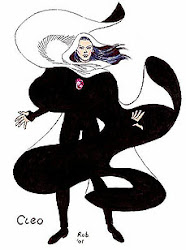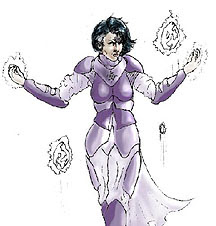About This Blog ~ This blog is about a series of Gay, Lesbian, Bisexual, and Transgender (GLBT) super-hero, sci-fi, fantasy adventure novels called Rainbow Arc of Fire. The main characters are imbued with extraordinary abilities. Their exploits are both varied and exciting, from a GLBT and a human perspective. You can follow Greg, Paul, Marina, Joan, William, and Joseph, as well as several others along the way, as they battle extraordinary foes or take on environmental threats all around the globe and even in outer space. You can access synopses of the ten books using the individual links on the upper, left-hand column.
The more recent posts are about events or issues that either are mentioned in one or more books in the series or at least influenced the writing of the series.
Sunday, June 21, 2020
Marine OCS Part 4
It might have been this first day that we were also marched to a barbershop where we were freed from our civilian hair and haircuts. Like shorn sheep, this effort also freed us of having to care for our hair while we were in training. We never had enough time to "shit, shower and shave" as it was. Washing and combing hair was one less effort to contend with. (A few weeks later, Dennis Zito, whom I mentioned before, had become a friend, along with John Robertson. Dennis had a fine, short-toothed comb that could create a part in our slowly lengthening hair. He returned from the latrine one weekend morning, coughed, pointed to his new part, barely noticeable and beamed with pride. We all laughed. Then I thought for a moment, borrowed his comb and went to the latrine to see what I could accomplish. My hair always grew fast--it still does, just not in as many places as it once did, unfortunately. I returned with an even more impressive part much to Dennis's chagrin.)
What happened the rest of that first day is a blank--we might have been given temporary military clothes to wear until we got our fatigues a few days later. All I do remember is that we finally went to bed in our bunks late that night. I got a top bunk which would cause me trouble the next morning. We were already given duties, the first being as a fire guard for the barracks, which also housed two other platoons in our Company. (Again, I don't remember exactly how, but every officer candidate was assigned to one of the three platoons in the Company. What criteria they used, I do not recall, but Bruce Culp and I were assigned to the same platoon, as indicated in that earlier photo of the platoon: Bravo Company, 1st Platoon. Alpha Company was housed in the barracks above on the right in that photo. We inhabited the front wing of the barracks on the left in the photo above.)
Most of us slept fitfully that first night. First, because we were all nervous about what the next days would present. Second, because one guy who was assigned fire watch that first night marched up and down the bay and then up the stairs to the other bays of Bravo Company. His marching kept us awake, as well. Fortunately, everyone soon learned that his marching was not necessary to be on the lookout for fires in these ancient fire traps. You quietly patrolled the bays in a slow walk so as to let everyone else get much-needed sleep. The third reason we slept fitfully was that beyond the barracks pictured above, there were railroad tracks. Trains running north-south barreled past the barracks at high speed, often in the middle of the night. They were always sudden and they were always loud. Their passage rattled the whole structure as if it might fall apart above our heads.
At some point I finally did drift off to sleep. But suddenly, I heard a loud metallic CRASH! I and most of the others were now fully awake, adrenaline flowing. And there was yelling. Lots of yelling followed, demanding that we get out of our bunks. I flew down to the floor, but the bunk slid across the waxed floor. The front of my right leg slammed against the side of the frame below my bunk and cut the skin. Not deeply but enough to draw blood which would not stop. As I tried to stand at attention by the bunk after my bunkmate and I had pushed it back into place, I was definitely favoring the leg because it hurt like hell. Just then Gunnery Sargant Williams walked past me and growled to know what was the matter. I pointed to my leg and explained what had happened. His demeanor softened and he told me to head to the latrine and try to get the bleeding stopped. I hobbled off to find some toilet paper. But it didn't help much. I quickly rejoined the others in bay.
What had awakened those of us asleep had been a large metal trash can hurled down the middle of the bay. A couple of the other candidates later explained, who had been awake before the melee began, they had seen Sgt. Williams bring the large metal trash can in the bay while Sgt. Blazer positioned himself at the light switch. It was a coordinated assault on our senses, and it did the trick. We were fully wired for the next several minutes.
After we got ready, we formed up outside the barracks and were marched to the chow hall. This required marching along the paved road from the barracks, past the "slop shoot" and toward the railroad crossing where the chow hall sat on the other side, behind the out-processing barracks.
Obviously, these days, with the barracks beside the parade grounds and on the other side of the railroad tracks from the old barracks, some of our rituals no longer apply. When the platoon marched and approached a cross street, the candidate marching the platoon was required to send out "road guards" to keep auto traffic from running into us. Also, when crossing the railroad tracks, the platoon leader was required to send out two "track guards" to position themselves, one on either side of the tracks, facing the direction where any oncoming train might barrel into the platoon. The road and track guards came from the second man from the front of each side of the two-column platoon. 'Track guards out!" and "Road guards out!" were the commands. When the potential danger had passed, the commands became either "Track guards in!" or "Road guards in!"
Food in the chow hall wasn't bad at the beginning of each month when a new crew of enlisted Marines were assigned to that duty. But as the month progressed, the quality and presentation of the food declined. Noticeable. Miraculously, when a new crew arrived at the start of the next month, it was obviously better.
One major difference between Marine OCS and Air Force OTS the following year was that during the entire Marine OCS experience, nobody bothered us while we ate. Food was an important component of marching and hiking and navigating the various physical training courses we were required to endure. We needed our energy and stamina. During Air Force OTS, the first three weeks we had to sit silently at a table, no talking, no looking up. The table had to sit down and get up together when you figured out that everyone else had finished. It was a bit stressful.

































